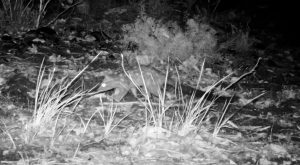Lack of feral control puts Julimar fauna at risk
Julimar Conservation and Forest Alliance (JCFA)
By Sharon Richards
 JULIMAR Forest has an interesting history of being home to a number of iconic Western Australian small mammal species.
JULIMAR Forest has an interesting history of being home to a number of iconic Western Australian small mammal species.
This historically includes the numbat, and currently the Western Quoll (Chuditch – picture to left), the Woylie, Brushtail Possum, Black Flanked Wallaby, Quenda and Bandicoots.
However, in recent times little research has been undertaken to determine which species are still thriving there.
In April 2023, in an endeavour to procure up-to-date information, the JCFA group contacted Wheatbelt Natural Resource Management (WNRM) and Department Biodiversity and Cultural Affairs (DBCA).
The JCFA requested to place motion sensor cameras in Julimar Forest, specifically to establish which nocturnal animals continue to live in the forest.
The WNRM agreed to support and fund the project by providing four high quality motion sensor cameras with some guidelines on where they should be placed.
A further four cameras were possibly available on loan from an additional NRM resource.
Cameras were placed at set locations that showed evidence of animal trails, and photographic images and GPS logs were collected every 3-4 weeks.
This data was then shared with WNRM and collated for DBCA, so both agencies will be updated.
The project was funded for 12 months.
The findings have been incredibly encouraging but also alarming.
The Chuditch was ‘captured’ on camera a number of times as one would expect with the Julimar Chuditch population known to be one of the healthiest in WA.
In the past Chuditch have been sent from Julimar to Shark Bay, Alice Springs and the Flinders Ranges to re-establish populations and increase genetic diversity.
Just last year healthy Chuditch were re-located to the Australian Wildlife Conservancy’s Mt Gibson sanctuary.
The Chuditch are regular visitors to some private properties abutting the Forest and have been seen rummaging around in old sheds and on private wildlife sensor cameras.
There have also been several sightings of the endangered Brushtail Possums, Tammar Wallaby, Echidna, Quenda as well as Black Gloved Wallabies and possibly a Dunnart (yet to be fully identified) all of which are rarely seen in the day.
One of the creatures we were delighted to capture on camera was the Woylie.
The Woylie is a shy nocturnal creature, so it is rarely seen by humans in its natural habitat.
From the photographs we have captured, there is a healthy population of Woylie in Julimar Forest.
There have also been multiple captures of the wonderful birds of Julimar including Emus, Carnaby Cockatoos, Dusky Wood Swallows and Rufous Tree Creepers as they forage on the ground.
A creature too fast for us to identify is the microbat, but it has been captured on camera.
Unfortunately, the sensor cameras also captured less desirable creatures including feral pigs, cats and a number of foxes.
All of us are aware that there can be feral animals, in our own backyards as well as the larger forested areas around Toodyay.
The concern for Julimar is that it does not have an adequate feral control program in place.
The current level of 1080 fox baiting is four times a year and there is no control whatsoever for the feral cats.
Some local farmers are currently working with the Shire to develop a plan to control feral pigs, with a number already having been trapped and disposed of.
Feral pigs have become a significant issue in Toodyay Shire having been sighted on and around a number of private properties as far and wide as Picnic Hill Road and Sandplain Road.
The Alcoa Foundation has partnered with Western Shield (the program responsible for delivering and monitoring the current 1080 baiting to control foxes) donating an additional $1 million over three years.
This funding will enable Western Shield to commence a more rigorous feral animal control program.
It will be in several locations in the Northern Jarrah Forests of South West WA with the most northerly point being the Avon Valley National Park.
1080 fox baiting will be increased to six times per year and the Eradicat program for feral cats will be added to the Western Shield program.
Eradicat has been tried and tested in the Eastern States and has been used in Kalbarri National Park in WA with good success.
Unfortunately, Julimar Forest has not been included in this new program and will instead be used as a control site.
This means that the current and inadequate fox baiting program continues and the feral cats in Julimar will continue to prey on the young Woylies, Chuditch and birds of Julimar.
Of the 14 creatures the new program is designed to protect, Julimar Forest provides a home and breeding grounds to at least nine of them, evident by our regular bird sighting expeditions and the camera project.
We question the ethics of this decision, given that the increased baiting is known to be effective.
Morally this decision is reprehensible and surely not ethical. When a solution to a known problem is found, surely it should be applied.
We know there is significant population of Chuditch and Woylie in Julimar, and whilst an adult Chuditch may hold its own against a feral cat the joeys will not, and all the small mammals are vulnerable to be preyed upon by foxes.
If you care about the local wildlife in and around the Julimar area please contact our local MP, DBCA or Western Shield and let them know you are not happy with the decision to withhold additional feral animal control from Julimar Forest.
All feral animals need to be controlled, and where possible eradicated, so that our Australian wildlife can thrive.
For further information contact – Julimar Conservation and Forest Alliance at
email:julimarforest@gmail.com.
